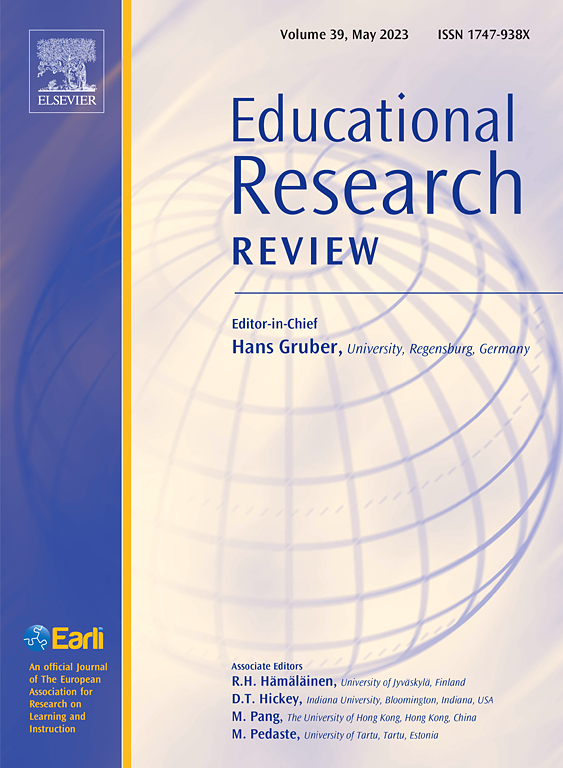Delving into data on students’ instructional knowledge: A scoping review of the empirical research
IF 10.6
1区 教育学
Q1 EDUCATION & EDUCATIONAL RESEARCH
引用次数: 0
Abstract
Students' knowledge of micro-level education – specifically, their knowledge of how education is provided – may impact their perception of the learning environment, which is often ill-adjusted to the situation. This discrepancy may negatively affect learning. To ensure the effectiveness of learning environments, it is therefore essential to take into account students' so-called ‘instructional knowledge’. However, this is made considerably difficult by the highly fragmented nature of available research. To address this issue, this scoping review aims to identify what characterizes the empirical literature on higher education students' instructional knowledge, with particular attention to theoretical foundations, conceptualizations, instrumentalizations, research aims, and findings. After an initial database search, systematic snowballing methods were employed to search for relevant literature. A screening based on specific eligibility criteria resulted in 71 included publications. Findings reveal a scarcity of theoretical underpinnings, which are highly diverse but also share some commonalities. Similarly, numerous conceptualizations were identified, revealing instructional knowledge as a layered construct that can be mapped onto a number of dimensions, such as, for instance, the knowledge domain in which descriptions are situated. Regarding the instruments used, research relies primarily on a specific type of self-report, and there are few psychometrically sound instruments to assess instructional knowledge. Furthermore, the analysis revealed that the research primarily revolves around three categories of aims, with a predominant focus on descriptive publications, and findings tend to be largely inconclusive. The review concludes by proposing a comprehensive, operationalizable conceptualization and updated model of instructional knowledge, providing a strong foundation for further research.
学生教学知识的数据挖掘:实证研究的范围回顾
学生对微观教育的认识,特别是他们对如何提供教育的认识,可能会影响他们对学习环境的看法,而这种看法往往无法适应实际情况。这种差异可能会对学习产生负面影响。因此,为了确保学习环境的有效性,必须考虑到学生的所谓“教学知识”。然而,由于现有研究的高度分散,这一工作相当困难。为了解决这一问题,本综述旨在确定高等教育学生教学知识的实证文献的特征,特别关注理论基础、概念化、工具化、研究目标和发现。在初步检索数据库后,采用系统滚雪球法检索相关文献。根据特定的资格标准进行筛选,结果纳入71份出版物。研究结果表明,缺乏理论基础,这些理论基础高度多样化,但也有一些共同点。同样,许多概念化也被确定,将教学知识揭示为一个分层结构,可以映射到许多维度,例如,描述所在的知识领域。关于所使用的工具,研究主要依赖于一种特定类型的自我报告,很少有心理测量学上健全的工具来评估教学知识。此外,分析显示,研究主要围绕三类目标展开,主要集中在描述性出版物上,研究结果往往在很大程度上是不确定的。本文最后提出了一个全面的、可操作的教学知识概念化和更新的教学知识模型,为进一步的研究提供了坚实的基础。
本文章由计算机程序翻译,如有差异,请以英文原文为准。
求助全文
约1分钟内获得全文
求助全文
来源期刊

Educational Research Review
EDUCATION & EDUCATIONAL RESEARCH-
CiteScore
19.40
自引率
0.90%
发文量
53
审稿时长
57 days
期刊介绍:
Educational Research Review is an international journal catering to researchers and diverse agencies keen on reviewing studies and theoretical papers in education at any level. The journal welcomes high-quality articles that address educational research problems through a review approach, encompassing thematic or methodological reviews and meta-analyses. With an inclusive scope, the journal does not limit itself to any specific age range and invites articles across various settings where learning and education take place, such as schools, corporate training, and both formal and informal educational environments.
 求助内容:
求助内容: 应助结果提醒方式:
应助结果提醒方式:


